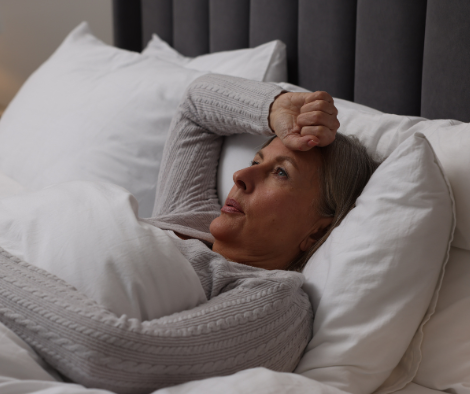If you’re reading this, you probably know the drill: tossing and turning, peeling the covers off, only to wake up drenched in sweat, feeling like you’ve been in a sauna all night. I’m 55, and for the past few years, menopause has been making its presence known in ways I never quite imagined. Night sweats and sleepless nights have been some of the toughest symptoms for me to manage, but along the way, I’ve picked up a few tips and tricks that have helped. If you’re going through the same struggles, I hope some of these can make a difference for you, too.
Why Do Night Sweats Happen?
Before we dive into how to cope, let’s talk about why night sweats happen in the first place. During menopause, our oestrogen levels drop, and that causes all sorts of changes in the body. One of the most frustrating effects is that the hypothalamus—basically your body’s thermostat—becomes more sensitive to temperature changes. So, when you’re in bed, your body can suddenly think it’s too hot and trigger sweating to cool you down, even though the room may feel perfectly fine.
For me, night sweats meant waking up several times during the night, dripping wet, and unable to fall back asleep. It was like my own personal internal radiator had gone haywire. But there are ways to manage this, even if you can’t always avoid it completely.
How to Keep Your Cool at Night
Over time, I’ve found some practical tips that help reduce the impact of night sweats. These small changes won’t stop menopause in its tracks, but they can certainly make the nights a bit more bearable.
1. Keep the Room Cool
This might sound obvious, but making sure your bedroom stays on the cooler side is key. Aim to keep the room temperature between 15-19°C. A fan can do wonders for keeping the air circulating, and in the winter months, cracking open a window (even just slightly) can help keep things fresh. I also invested in cooling pillows and a mattress cover that wicks away moisture, and I’ve noticed a big difference.
2. Layer Your Bedding
Instead of using one heavy duvet, try layering lighter blankets. Natural fabrics like cotton and bamboo are brilliant for letting your skin breathe. This way, you can easily adjust throughout the night—throwing off a layer if needed—without having to strip the whole bed when a night sweat strikes.
3. Invest in Moisture-Wicking Sleepwear
One of the best investments I’ve made is in moisture-wicking pyjamas. These work wonders in drawing sweat away from your skin, keeping you feeling dry and comfortable even when you have a hot flush. It’s such a small change, but it can make a huge difference to how quickly you fall back asleep.
4. Be Mindful of What You Eat and Drink Before Bed
Caffeine, alcohol, and spicy foods can be night sweat triggers, so I’ve started cutting these out in the evenings. Instead, I opt for herbal teas—chamomile is my go-to—as it helps me wind down and doesn’t aggravate my symptoms.
5. Stay Hydrated
Staying well-hydrated during the day has helped reduce the intensity of my night sweats. Keep a glass of cool water by your bedside so you can rehydrate quickly if you wake up overheated.
Exploring Treatment Options
While lifestyle changes have made a difference, I realised at one point that I needed more support. If you’re in the UK, you’ve probably heard that accessing menopause treatment through the NHS can be a bit of a challenge. Long waiting lists and the difficulty of finding a GP who truly understands menopause can leave you feeling stuck. That’s why many women, including myself, look into private treatment options.
After years of sleepless nights, I finally consulted a menopause specialist. One of the best decisions I made was exploring Hormone Replacement Therapy (HRT). HRT helps replace the hormones that drop during menopause and can significantly reduce symptoms like night sweats and hot flushes. For me, it’s been a real lifeline.
Luckily, you don’t have to jump through hoops to get started with HRT these days. You can now buy HRT online in the UK, which makes it much more accessible. Some women find HRT gel more convenient to use, while others prefer patches, which you can also order online. If you’re considering treatment, it’s worth booking a private menopause consultation with a menopause specialist to discuss the options. This way, you can get a private HRT prescription tailored to your needs and avoid the hassle of long NHS wait times.
Finding the Right Help
It’s no secret that getting menopause treatment on the NHS can feel like an uphill battle. That’s why so many of us turn to private healthcare options to get the support we need without waiting months only to be turned away by an NHS clinician that doesn’t understand the burden that menopause can put on our life. If you’re struggling to find the right help, don’t hesitate to reach out for a menopause clinic appointment or to order HRT patches or gels online.
The good news is that you don’t have to suffer through sleepless nights and night sweats without a plan. There are real, tangible steps you can take—whether it’s lifestyle changes, HRT, or a combination of both—that can help you regain control of your nights (and your days!).
You’re Not Alone
Menopause can feel like an isolating time, but it’s important to remember that millions of women are walking the same path. You’re not alone, and there’s no shame in seeking help. Whether it’s through lifestyle adjustments, medical treatment, or talking to a menopause doctor, there’s support available. Don’t be afraid to reach out and get the care you deserve.
Here’s to cooler, calmer nights ahead!

